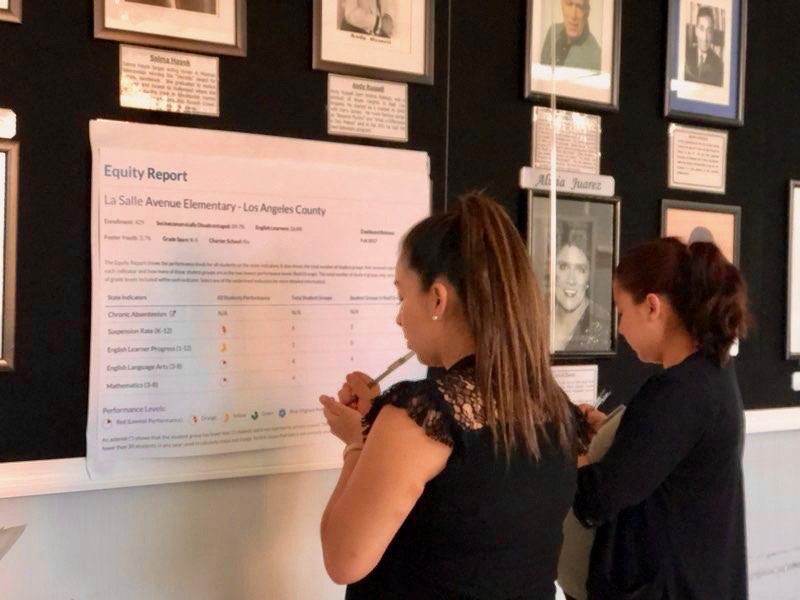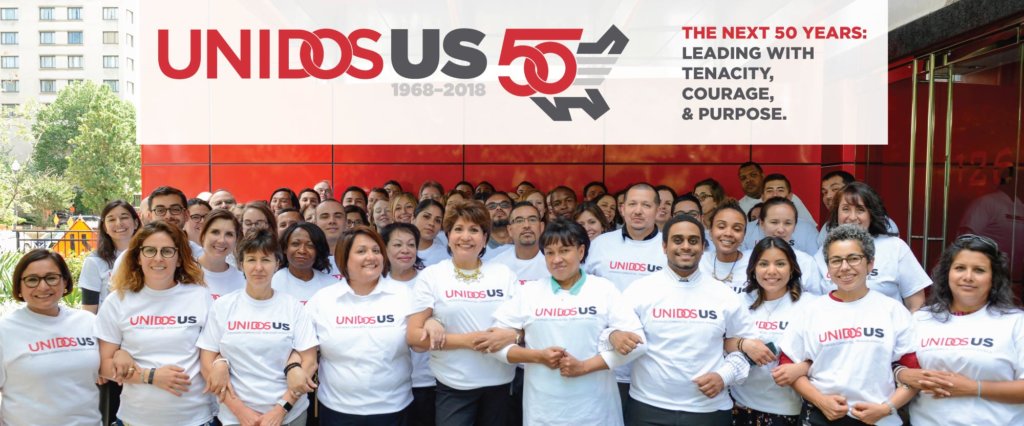‘We Parents Have to Be Involved’: How UnidosUS Is Making It Easier for Parents to Be Advocates for Students

Monitoring a child’s education and advocating for resources and strategies to improve that experience is hard for any busy parent in America. It’s even harder for parents who didn’t grow up in the U.S. school system, don’t speak fluent English, or don’t feel able to engage the proper authorities. Last week in Los Angeles, UnidosUS sought to address this by partnering with the nationwide school rating organization GreatSchools to roll out Leveraging School Data for Advocacy, a five-hour, fast-track parent engagement and advocacy workshop rooted in longer UnidosUS curriculums.
“Sometimes parents have doubts and concerns but don’t know exactly where to go for help, how to ask for what they want, or what it is they actually need,” says Cruscita Sanchez, who came as both a mother and as a member of the executive policy board for the UnidosUS Affiliate Mexican American Opportunity Foundation (MOAF). “We can quickly share what we learn here, creating a chain of knowledge for other parents.”

The workshop began with an introductory lecture from Cayla Conway, Education Outreach Manager at UnidosUS. As part of that lecture, all participants were presented with a Samsung tablet on which they could work together to build a word cloud around the term advocacy. This same piece of technology helped them explore the California School Dashboard and GreatSchools’ own summary ratings and school profiles, both online tools that categorize and rank schools according to indicators such as graduation and suspension rates, math and English test scores, and English learner progress.
“The California School Dashboard can be difficult for parents to understand because the indicators receive colors depending on performance in the current and previous year,” says Conway, noting the importance of sharing many resources with parents. “Other tools, like the ones offered through GreatSchools, help parents decipher important accountability information so they can be well-informed advocates for their children and school.”
This pilot is rooted in two of UnidosUS’s larger parent engagement and advocacy curriculums. Padres Comprometidos is a nine-sessioncurriculum that helps parents understand how to interface with teachers and school administrators. For those parents yearning to take greater leadership roles such as joining the PTA or pushing for new resources and school curriculums, UnidosUS used to offer an occasional two-day Parent Advocacy Training, but it sometimes required parents to travel to another city to participate.
“With this pilot, we come to them. We’re trying to test the waters of professional development for parent facilitators by making it more accessible to more people,” says Conway.
Monica Otlica, another mother and MOAF executive policy board member attending the pilot program, says she is glad she can now interpret the dashboards.
“What caught my attention was that Latino academic performance in my children’s schools lags far behind any other group of students, especially when it comes to English language learning and reading comprehension. The leaders of this workshop gave us a lot of great tips for pushing to change that,” Otlica says.
“This data teaches us that we need to be more strategic,” seconds Sanchez. “Maybe teachers lack the resources or maybe they just aren’t taking the initiative to work with what they have. There are lots of things that could be done to address this, but we parents have to be involved.”
Both advocate mothers said they welcome more trainings like this. In fact, all of the participants of last week’s pilot were offered information on UnidosUS’s larger parent engagement and advocacy initiatives. They said the timing of the training was excellent, especially since the first round of parent-teacher conferences begins later this month.
UnidosUS now hopes to try this faster-paced program across the state. Otlica says the one thing she’d change is to add an extra hour or so to the current five-hour format.
“Most of the parents had a lot of questions, and those questions led to other questions,” she explains. “We needed just a little more time for that. “
UnidosUS Director of Parent and Community Engagement Jose Rodriguez is glad to hear parents speaking up with these types of suggestions. He says all across the nation there are cases of school authorities leaving Latino parents out of strategic planning initiatives because they know don’t speak English, they assume a parent is undocumented and afraid to come forward, or they figure their kids aren’t college bound.
“We’re giving parents more confidence and knowledge,” he says. “By defining what advocacy means to them, we help parents look at the educational landscape of their children’s school, identify a problem, and come up with a solution.”
– Author Julienne Gage is the UnidosUS Progress Report Senior Web Content Manager.





